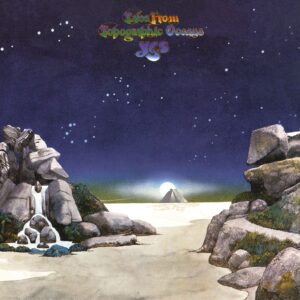The Revealing Tides of Topographic Oceans

It’s been a momentous year for album anniversaries. The fact that 1973 saw the release of so many great and legendary albums has meant a continual outpouring of affection for the likes of Aladdin Sane, For Your Pleasure, Innervisions, Goodbye Yellow Brick Road and Quadrophenia upon their Golden Anniversaries, throughout 2023. All are worthy of such praise as each are records whose merit within the rock music canon has increased in the subsequent half century. So, when choosing just one album anniversary to celebrate on the blog this year, why choose one that was critically lambasted at the time, received a luke-warm response from diehard fans and whose reputation has improved little since? I shall tell you why; Tales From Topographic Oceans is an oddball. It is that awkward, daydreaming child that stands at the edge of the playground at lunch time, shy and abandoned, wandering which of the school bully’s will steal their dinner money next. And when that happens, I want to be the one who steps in to fight their corner, and takes a black eye in the process. Fools rush in where Angel’s fear to tread, as they say.
In many ways Tales From Topographic Oceans is the definitive progressive rock album; four 20 minute tracks across 2 LP’s, a concept inspired by ancient scriptures, a gatefold sleeve luxuriantly adorned with fantastical Roger Dean artwork, and, in true Spinal Tap style, tales of the band recording the whole thing whilst surrounded by fake cows in order to capture a mood. All in all, and to paraphrase Nigel Tufnel, you would have to say, ‘none more prog’. 1973 was also the year in which each of Yes’ fellow prog rock heavyweights released what some might consider to be their greatest works: Pink Floyd broke all records with Dark Side of the Moon, Genesis came up with an LP that frequently tops ‘Best prog album of all time’ polls with Selling England By The Pound, and King Crimson unleashed their finest artistic statement to date with Larks Tongues in Aspic. Each had been released earlier in the year, so a standard had been set and the pressure was probably on Yes to release an album that was strong enough to stand shoulder to shoulder with its competitors, particularly in light of the previous year’s critically lauded Close to The Edge. Expectations must have been high.
Crucially, the classic albums mentioned thus far were single LP’s. Most classic albums are, if we’re honest. And I think that’s the most important thing to say when defending Topographic Oceans, if it had been released as just one record it would, I think, be held in far greater esteem, and would certainly have seemed less of a challenging listen. The opening track, The Revealing Science of God, clocks in at 22-minutes but is, I think, one of the band’s finest. The way the portentous opening section builds to a crescendo, giving way to Rick Wakeman’s simple but infectious keyboard hook, is both lyrically befuddling and musically transcendent. And that’s the albums appeal in a nutshell really, it’s complicated and confusing, a difficult listen at times for sure, particularly sides 3 & 4, but The Revealing Science is the high point. The way it ebbs and flows, segueing smoothly from one passage to another, leading to a natural and triumphant conclusion, it’s probably the one track that succeeds in capturing Anderson and Howe’s original musical vision for the album.
Though collaborative to a point, of all the Yes albums of that classic 70’s period I think of Topographic Oceans as much a Jon Anderson album as a co-operative effort. From what I’ve read about it over the years, that was a feeling shared by certain members of the band, which ultimately led to Wakeman’s departure – although the fact that his keyboards were sat on bales of hay in the studio probably didn’t help. But that’s what I love about Jon Anderson. He was a visionary; rock music’s astral traveller, constantly pushing the boundaries in an attempt to attain some celestial goal whose secret had been lost to the ages. It must be difficult to explain what it is your after when the thing in question is beyond imagining. But he was trying to achieve something, and would do all he could to replicate the ideas and sounds that were in his head. When he expressed a desire to record the album in the countryside – in a forest to be precise – in order to capture a bucolic mood and lessen tensions that had been forming within the group, he was, unsurprisingly, out-voted. A compromise was reached, however, and so it was that the band de-camped to Morgan Studios in North London, for recording sessions in which the studio was bedecked with flowers, accompanied by cut-out cattle & sheep, haystacks and picket-fences, with Wakeman finding himself literally fenced-in. But as outlandish and ludicrous as Anderson’s idea seems now, there is definitely a tranquil, rural feel to the music on the album, on side 2’s The Remembering in particular, so perhaps the cows worked their magic after all.
Tales From Topographic Oceans should be applauded for its ambition if nothing else. It’s an album of two halves, and two opposing characters. Record 1 is great, and in isolation rewards repeated listening and reveals itself to be one of the band’s strongest albums, and could perhaps be seen as the natural conclusion to the progress and achievements the band had made in that early, classic era. Record 2 is messy and over-indulgent. There are good ideas in there, and perhaps if those brief high-points had been melded together a decent track could have resulted, and possibly saved for the next album or worked into the first record somehow. From a listeners point of view, it didn’t need to be a double album. As a package, it’s strong, with the artwork and overall presentation as good as anything Roger Dean has produced for the band. Musically, no one can question the ambition, but perhaps it took progression too far, falling victim to its own vision. Then again, perhaps we’re missing the point. Perhaps the Oceans secrets are yet to be revealed. Maybe Jon Anderson had cracked the ancient, mystical code after all, and subsequently buried the answer to all things within a labyrinth of confusing lyrics and mind-bending music. If that’s the case, Tales From Topographic Oceans could yet prove it’s worth.



